At Home in Mitford Read online
Page 6
“And Clyde said, ‘Why, law, that feels like some kind of a golf ball or somethin’ in there,’ and don’t you know, Darlene took to barkin’, and that thing took to hurtin’, and I never laid my head on th’ pillow ’til way up in the mornin’. Wouldn’t you like a pound or two of these nice snap beans?”
Worse than that, according to some, was Darlene, Hattie’s Chihuahua, who lay on a sack by the cash register. Every time Hattie rang up a sale, the dog growled and snapped at the customer.
Avis Packard once said that Hattie Cloer had sent more business to The Local than any advertising he’d ever run in the paper.
Two weeks after his first jog up to Church Hill, Father Tim made an early Saturday call at The Local.
Since Barnabas was running with him these days, he found it convenient that The Local had an old bike rack near the front door, where the dog could be tied on a short leash.
He was still out of breath, and Barnabas was panting with some exhaustion himself. The route had by now fallen into place. They ran through Baxter Park and up to Church Hill, then along the quiet road by Miss Sadie’s apple orchards, past the Presbyterian Church, three times around the parking lot, down Lilac Road to Main Street, and then to Wisteria Lane where they turned toward home.
“Two miles, right on the money,” he discovered with immense satisfaction.
“Mornin’, Father,” said Avis, who was sitting at the cash register. “How does joggin’ compare to workin’ up a sermon?”
“Well, Avis, I can’t see as there’s much difference. I dread both, but once I get started, there’s nothing I’d rather be doing.”
“We got those fine-lookin’ brown eggs you like. And Luther Lovell’s boys delivered the nicest bunch of broilers you ever seen. You ought to look at those, and check that pretty batch of calf liver while you’re at it.”
One thing Father Tim liked about Avis Packard was the way he got excited about his groceries. He could rhapsodize about the first fresh strawberries from the valley in a way that made him a veritable Wordsworth of garden fare. “We got a special today on tenderloin that’s so true to the meanin’ of th’ name, you can cut it with a fork.”
"Well, now, I’m not shopping, Avis. I’m looking.”
“What’re you lookin’ for?” Avis cocked his head to one side like he always did when he asked a question.
“Ideas. You see, I’ve decided to give a dinner party.”
“You don’t mean it!”
“Oh, I do. But the thing is, I don’t know what to cook.”
“Well, sir, that’s a problem, all right. I’ll be thinkin’ about it while you look around,” Avis assured him.
A little line was forming at the cash register, so the rector moved away, greeting shoppers as he went.
He stopped to talk to everyone, taking note that four people wondered where his collar was, and only one inquired about the painting, for which he was grateful.
At the produce bins, he admitted he was feeling slightly nervous over his idea. First of all, he didn’t even have a guest list.
Of course, he was going to ask Emma, and yes, Miss Sadie. He thought she would make a splendid contribution. Besides, he had heard she once went to school in Paris, and he wanted to know more about it.
Hal and Marge, of course. No doubt about that. Hoppy Harper, now there was a thought, his wife gone and no one to look after him but that old housekeeper. That made six, including himself.
Six. For the life of him, he couldn’t think of another soul that would fit in just right with that particular group.
Perhaps he should invite Winnie Ivey, since she was always feeding everybody else. Maybe he would do that.
Avis came down the aisle with a gleam in his eye. “I turned the register over to my boy. I want to help you get your party goin.’ What do you think about beef stroganoff, a salad with bibb lettuce, chickory, slices of navel orange and spring onions, and new potatoes roasted with fresh rosemary? ’Course, I’d put a nice bottle of cabernet behind that. 1982.”
He sat with Barnabas one evening with a lapful of cookbooks. As much as he appreciated Avis Packard’s menu planning, beef stroganoff seemed too ordinary. He wanted something that spoke of spring, that made people feel there was a celebration going on, and that would fill them up without being too heavy.
“This is a lot of work,” he confided to Barnabas, who appeared to understand, “and I haven’t even started yet.”
He wondered why he had waited so long to entertain. It was clear to him that he had gotten completely out of the notion, although once he had loved doing it. He’d had the bishop and his wife for tea three times and twice for dinner, the vestry had come for a light supper on at least four occasions, and, once, he had the courage to give a luncheon for the members of the Altar Guild, who had such a good time they didn’t leave until four o’clock.
Not that he was a great cook, of course. Still, he wasn’t half bad at barbecued short ribs, an occasional sirloin tip roast that would melt in your mouth, if he did say so himself, and, in the summer, Silver Queen corn, cooked in milk for precisely sixty seconds. Of course, there was always the economical Rector’s Meatloaf, as he’d come to call it, which he usually made at least once a week.
He’d even been known to bake his own bread, but the interest these days somehow eluded him. Gardening had taken over. And where once he had sat and read cookbooks, he now read catalogs from Wayside Gardens and White Flower Farms, not to mention Jackson and Perkins.
“And another thing,” he said to Barnabas, who raised one ear in response, “is the cost. Do you realize what entertaining costs these day?”
Barnabas yawned.
“Lamb, I think it should be lamb,” he mused to himself after going to bed. And he didn’t think it should take the form of anything nouvelle.
The thought came to him as he laid his head on the pillow. Company Stew! It was an old recipe, nearly forgotten, but one that had always brought raves.
He got out of bed and put on his faded burgundy dressing gown. Noticing that the clock said eleven, he slipped his feet into the chewed leather slippers and went downstairs to look for the recipe.
The search revealed how vagrant his closets had become, so he began rearranging the one in the hall, which, very likely, his guests might see.
When he finished, he was surprised to find that it was two o’clock in the morning, and he’d collected a boxful of odds and ends for the “Bane and Blessing” sale.
It was rather a free feeling, he noticed, prowling about the house at such an odd hour. To explore this strange freedom even further, he went into the kitchen, made himself a meatloaf sandwich with no mayonnaise, and sat at the table reading Bon Appétit, which he had bought for ideas and inspiration.
“No wonder I haven’t done this sort of thing in years,” he muttered. “It’s too demanding.”
He was feeling the way he’d felt when they asked him to be on the Garden Tour.
Though the tour was to be of gardens only, he’d given the rectory a room-by-room inspection. It was as if he were seeing it for the first time.
To his amazement, every ceiling corner seemed to have a spiderweb, there was clearly a ring in his bathtub, the shower tiles were mildewed, and the kitchen cabinets were in such a tangle of confusion, it had taken a full half hour to locate his double boiler.
At what point things had fallen into this state, he couldn’t say. But fallen they had, and by the time of the tour, he was so exhausted from making both house and garden ready, that he went to Meadowgate Farm for the entire weekend, inviting a retired priest from Wesley to conduct Sunday services.
Now, he found himself compulsively cleaning out drawers his guests would never open and closets they would never see, and polishing silver they would never use. But, he assured himself, it was a perfect time to get caught up. A dinner party provided the most excellent of excuses.
“You need house help,” Emma had told him, again and again.
But then,
he was often told that he needed one thing or another: a cat, a bird, a gazebo, earmuffs, English garden tools, a word processor, a vacation, a bicycle, a wife, and, until Barnabas, a dog. Several people had even made the unwelcome suggestion that he get himself a microwave.
When he invited Emma on Monday morning, she was inspired at once to submit plans of her own.
“I’ll bring the potato salad,” she said happily. “And make a batch of yeast rolls.”
“No, you won’t bring a thing. This is a bona fide party where all you have to do is show up.”
“Why not make it a covered dish? You don’t need to do all that cookin’ by yourself. Marge could bring her chocolate cake they wrote up in the newspaper, and Hoppy Harper’s house help could make somethin’ for him to bring . . .”
She was doing it again—treating him like a ten-year-old.
“Emma, no one is to bring anything. And that’s final.”
It was indeed final, as she could plainly tell.
He washed the slipcover on the sofa in his study, dusted books on the shelves that were low enough for anyone to reach, ordered four pounds of Avis Packard’s valley-grown lamb and two bottles of a ridiculously expensive cabernet, asked Winnie Ivey to bake a special triple-chocolate cake with raspberry filling, hung a new bird feeder outside the dining room windows, and pondered washing the study window that overlooked the best part of the garden. At this, however, he balked.
As he might have guessed, everyone in the village seemed to know about the evening, which was now only a few days away. It amazed him that a man couldn’t have a simple dinner party without attracting the attention of everybody from the postal clerk to the dry cleaner. “We hear you’re havin’ a big blow-out,” his barber said, while taking a little more off the sides than they’d discussed. Were people looking at him as if they should have been invited? Couldn’t a man have a few friends over without asking the whole blasted town?
Though he still wanted to invite two others, he couldn’t decide who they should be. In the meantime, he had ordered for eight and was preparing for eight, and was relieved that everyone not only could come, but seemed pleased at the prospect.
He’d also given some thought to Barnabas. Perhaps he would allow his friend into the study after dinner. Which meant, of course, that Barnabas would need a bath.
At the office one morning, it occurred to him that, instead of bathing Barnabas in the guest room shower stall, he would stop by the hardware store and buy a large tin tub. That way, he could begin the practice of bathing him in the garden and avoid the clean-up in the bathroom.
After a quick lunch with Harry Nelson, who reported that the origin of the painting still hadn’t been verified, he went to the hardware.
One of his favorite smells was that of an old hardware store. In fact, it was right up there with the smell of wood smoke, leather-bound books, and leaf mold after a rain. More than that, it unfailingly brought back a rush of memories from his Mississippi boyhood.
As a 4-H rabbit grower for two years, he had often traded at the local hardware for hutch materials and feed. He could even remember the time he picked out six yellow goslings from a box kept warm by a lightbulb.
He decided on a tin tub for $22.95, and took it to Dora Pugh at the cash register.
“You want to drive around for this, Father?”
“No, Dora, this is cash and carry.”
“I see you walk by here every day, and I still forget you don’t drive a car. How in the nation do you make out?”
“Not too bad, actually. Nearly everything I could want, and some things I don’t, are all right here in these two town blocks.”
“I guess you’re goin’ to tote this tub on your head like in Africa?”
He gave her cash to the penny. “I don’t know exactly how I’m going to do it till I get started.”
He tried to hold the tub under his arm, but that didn’t seem to work, so he took it by one of the handles and was disappointed to note that the rim of it banged against his ankle as he walked to the door.
Turning to say goodbye, he saw that Dora had ducked down behind the pocketknife display case, shaking with laughter.
“Dora, I see you back there laughing! You better quit that and show some respect to the clergy!”
He waved cheerfully and stepped out on the sidewalk, pleased with both his idea and his purchase. He just hoped that people did not think him eccentric. He would far rather be thought ingenious or practical.
By the time he turned the corner at the bank and headed home, he was willing to admit that a car provided something more valuable than convenience. It provided privacy. Otherwise, he reasoned, everyone passing by could stare into your business, which one and all seemed to be doing.
He hurried the last half block to the rectory, set the tub down in a clearing amid some laurel, and unwound the garden hose to make certain it would reach. “Perfect!” he exclaimed, warming to his task on Friday.
On Friday, he left the office early, stopped by The Local, and went home to change into an old T-shirt and khaki pants.
He would get the bath out of the way straight off, he thought, then begin the stew around three, open the wine to breathe at six, and have everything in good order for his guests at seven.
When he opened the door to the garage, Barnabas leaped into the hallway, skidded nearly the length of it on a small Oriental rug, then dashed into the kitchen and hurled himself onto the bar stool, where he began to lick a vinyl placemat on the counter.
The rector put Barnabas on his longest leash. Not only would this give him freedom to thrash about in the bath, it would keep him from bounding into the street if the new setup alarmed him.
Unfortunately, this would prove to be the worst idea he’d had in a very long time.
He was pleased with his location of the tub. The little clearing was shielded from the street by the laurels, and afforded him plenty of elbow room. As soon as Barnabas was bathed, he thought, he’d rub him down with a towel, then lead him into the garage where he could finish drying off and make himself presentable.
Attaching the looped end of the leash to a laurel branch high over his head, he encouraged Barnabas to get into the water, which he’d liberally sudsed with Joy.
Instead, Barnabas hurled himself into the tub with a mighty leap.
Just as quickly as he went in, he came out, diving between the rector’s legs. He circled his right leg and plunged back into the water, soaking his master from head to foot.
Then, he leaped out of the tub, raced again between Father Tim’s legs, joyfully dashed around his left ankle, and headed for a laurel bush.
It seemed to the rector that it all happened within a matter of seconds. And while his memory searched wildly for a Scripture, nothing came forth.
Barnabas circled the bush at a dead heat, catching the leash in the crotch of a lower limb, and was brought to an abrupt halt.
The tautly drawn leash had run out. Barnabas was trapped on the bush. And each of the rector’s ankles was tightly bound.
Shaken, Father Tim observed this set of circumstances from a sitting position, and in the most complete state of shock he could remember.
Miraculously, he was still wearing his glasses.
Barnabas was now lying down, though the leash was caught so tightly in the tree that he could not lower his head. He stared at Father Tim, obviously suffering the misery of remorse. Then, his contrition being so deep that he could not bear to look his master in the eye, he appeared to fall into a deep sleep.
The rector began spontaneously to preach one of the most electrifying sermons of his career.
His deep memory bank of Holy Scripture came flooding back, and the power of his impassioned exhortation made the hair fairly bristle on the black dog’s neck. In fact, Barnabas opened his eyes and listened intently to every word.
When his oration ended, the rector felt sufficiently relieved to try and figure out what to do.
He could see it now. His gu
ests ringing the doorbell, finally coming inside, searching the house, calling out the back door, and then spying him in this miserable condition, while the stew pot sat cold on the stove.
No wonder so many people these days had heart fibrillations, high blood pressure, and a thousand other stress-related diseases. No doubt all of these people were dog owners.
Lord, be thou my helper, he prayed.
“Father Tim! Is that you back there?”
Avis Packard came crashing through the laurel hedge, looked down at his good customer, and said, without blinking, “I let you get away without your butter. Do you want me to put it in the refrigerator or just leave it right here?”
Fortunately, the washtub incident had put him only an hour off schedule.
The stew was on and simmering, and the fragrance in the rectory was intoxicating. The old walnut dining table gleamed under the chandelier and cast a soft glow over a silver bowl of yellow roses tinged with crimson. The cabernet sparkled in cut-glass decanters, the strains of a Mozart sonata filled the rooms with an air of expectancy, and in the fading afternoon light, the gardens looked fresh and inviting from every window.
He felt rather fresh and inviting, himself, having shaved and showered. Also, he was wearing his new sport coat.
He hadn’t come up with two more guests who would perfectly fit in, but he saw this as an advantage. Tonight’s little gathering would be relaxed and intimate, like family, and all would get a chance to know each other better.
At 6:45, the bell rang, and while the invitation was for 7:00, he was ready and waiting. He opened the door to see Miss Rose and Uncle Billy, standing on the porch holding hands and dressed in their best finery.
“Preacher,” said Uncle Billy, grinning broadly, “we didn’t know if you was ever goin’ to visit us, so we come t’ visit you.”
Emma arrived at 7:00 sharp, parking her lilac Oldsmobile in the rectory drive. Hoppy Harper’s old Volvo station wagon pulled in behind her.
Emma glanced furtively in the rearview mirror to see whether she was wearing enough eye shadow, as Hoppy walked up to open her door. She thought he looked surprisingly boyish in a cotton sweater and khakis.

 A Light in the Window
A Light in the Window Somewhere Safe With Somebody Good
Somewhere Safe With Somebody Good In This Mountain
In This Mountain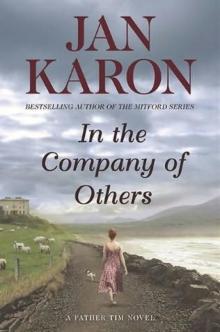 In the Company of Others
In the Company of Others Come Rain or Come Shine
Come Rain or Come Shine To Be Where You Are
To Be Where You Are These High, Green Hills
These High, Green Hills Light From Heaven
Light From Heaven A New Song
A New Song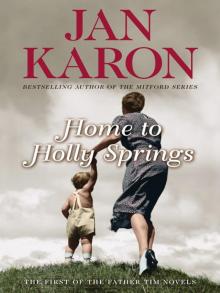 Home to Holly Springs
Home to Holly Springs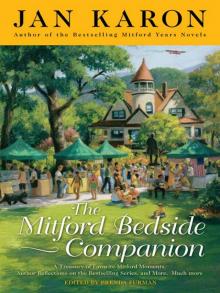 The Mitford Bedside Companion
The Mitford Bedside Companion At Home in Mitford
At Home in Mitford Shepherds Abiding
Shepherds Abiding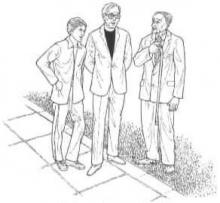 Out to Canaan
Out to Canaan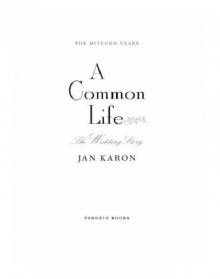 A Common Life: The Wedding Story
A Common Life: The Wedding Story Jan Karon's Mitford Years
Jan Karon's Mitford Years